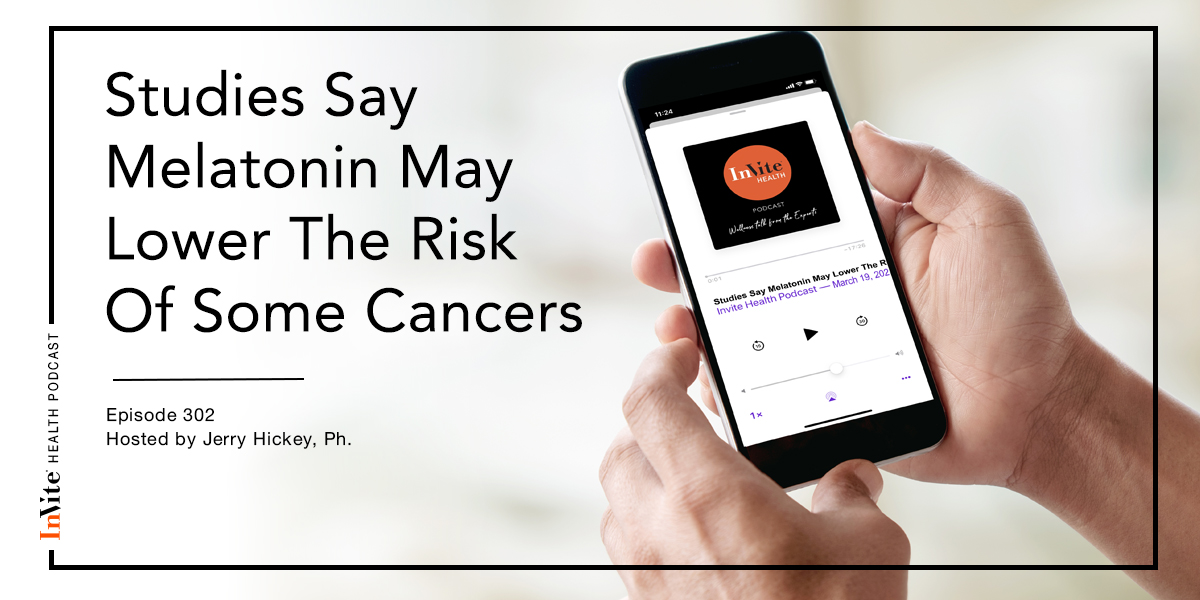Studies Say Melatonin May Lower The Risk Of Some Cancers – InVite Health Podcast, Episode 302

melatonin
Invite Health Podcast, Episode hosted by Jerry Hickey. Ph
Subscribe Today!
Melatonin is a hormone that’s sold as a supplement that’s best known for sleep, but now, due to the pandemic, it’s also known for its effects on your immune system. It may also hold some ability to lower your risk of a whole bunch of cancers and there’s mounting evidence that, additionally, it may help you fight cancer.
The importance of sleep
There has been a lot of research done for decades now looking at how night-shift work has consistently been connected with developing heart disease, but there is also a lot of evidence consistently showing that people who work shift work at night have a much higher risk of cancers. The research is so strong and abundant that in 2007, the World Health Organization (WHO) classified nighttime shift work as a probable carcinogen and it’s due to a disruption in your circadian rhythm.†
Your circadian rhythm is your internal clock. At night, you’re expressing melatonin and it helps you go to sleep. A lot of things happen at night. Learning occurs at night and you pass temporary memories into long-term storage sites for memories. Bone building takes place at night. Getting the immune system ready for the next day happens at night. But also, there’s a lot to do with cancer prevention taking place at night.†
Why Melatonin Is Important During COVID-19 – InVite Health Podcast, Episode 209. Listen Now >>
When you’re not getting sleep, you’re disturbing your circadian rhythm and the body gets confused. It gets mixed up with night and day. Your immune system is supposed to rest at night because you’re home, you’re not in the office surrounded by a dozen people. In the daytime, when you’re surrounded by a lot more people and you’re going from place to place, then your immune system must be active. When your circadian rhythm is thrown off, your body can no longer register when it’s night or day, and the immune system gets thrown off. It becomes more active at night than during the day, but it’s during the day that you’re bumping into people. This also seems to affect your cancer risk.†
Melatonin and cancer
How could melatonin help with cancer? First of all, immune cells express melatonin. At night, melatonin calms the immune system down, lowers the blood pressure and lowers the body temperature so you can sleep well. In the daytime, you express other things like cortisol and everything gets activated again. But melatonin is so important to your immune cells that they actually release melatonin. It’s part and parcel of helping your white blood cells fight viruses and bacteria.†
Melatonin has some evidence, and it’s mounting, that it helps prevent cancer in the first place. Italian researchers at the University of Cantabria’s Department of Physiology and Pharmacology did a study that was published in the journal Molecules that looked at whether or not melatonin could reduce the risk of developing breast cancer. That’s a very common cancer. What they were saying is that women who work night shifts and have thrown off their circadian rhythm are at a higher risk of breast cancer due to the night shift work. They said that this was due to the light-induced inhibition of melatonin release. Melatonin helps prevent estrogens from damaging breast tissue. These researchers were saying that actually giving the women who are working night shifts melatonin helps reduce the risk because it helps protect the breasts from the estrogens themselves, as well as from xenoestrogens.†
Why Sleep Is Required For Memory – InVite Health Podcast, Episode 296. Listen Now >>
Tune into the full podcast episode for more studies indicating the relationship between melatonin and cancer.
Thank you for tuning in to the Invite Health Podcast. You can find all of our episodes for free wherever you listen to podcasts or by visiting www.invitehealth.com/podcast. Make sure you subscribe and leave us a review! Follow us on Facebook, Twitter and Instagram at Invite Health today. We’ll see you next time on another episode of the Invite Health Podcast.


